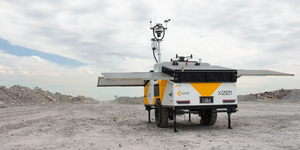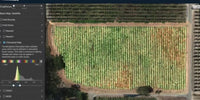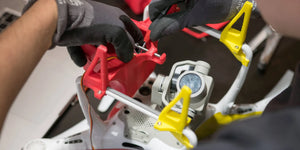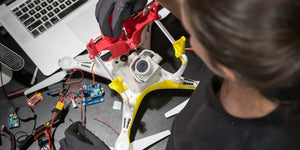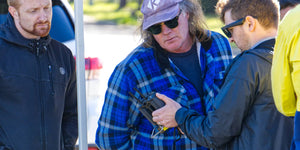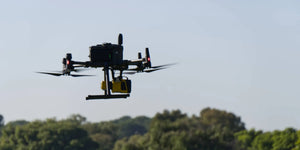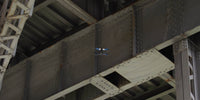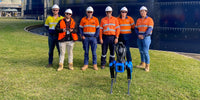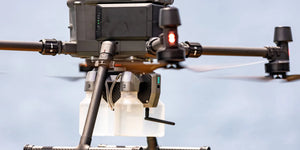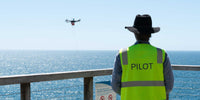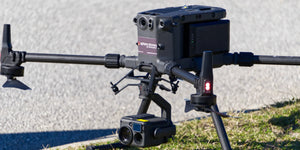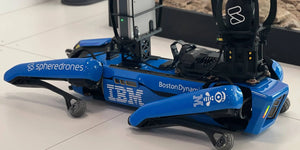DJI, the global leader in civilian drones and creative camera technology, today launches a comprehensive cinematography system that heralds the next generation of film production. DJI Ronin 4D combines the all-new full-frame Zenmuse X9 gimbal camera, a 4-axis stabilization system, a LiDAR focusing system, and an unrivaled video transmission and control system in a single unit. Designed and built to the exacting standards of professional filmmakers, DJI Ronin 4D makes high-end productions more efficient, makes spectacular camera moves possible in the most convenient way, and enables creative professionals to tell their stories with an entirely new visual language.
DJI empowers creators with accessible and intuitive devices to capture and share the world exactly how they see it,” said Paul Pan, DJI Senior Product Line Manager. “With DJI Ronin 4D, we use the power of technology to make cinema-standard production more affordable, cinema cameras more flexible, and cinematic imaging available to a boundless array of filmmakers. DJI Ronin 4D draws on our expertise in both aerial and ground-based cinematic innovations to enable the next generation of professional content creators to amaze and inspire us.
The Most Powerful Cinematic Imaging System DJI Has Ever Created
Excellent filmmaking begins with the perfect shot, which is why DJI developed its most powerful cinematic imaging platform to date. A flagship proprietary chipset fuels an intelligent image processing system, CineCore 3.0, which delivers an internal 8K RAW codec with precise color reproduction, advanced assistive functions with a high-performance AI engine, and multi-link monitoring and control with low-latency image processing.
Complementing the imaging system is a brand-new, full-frame Zenmuse X9 gimbal camera – available in 8K and 6K versions – that allows cinematographers to capture footage in full cinematic quality. In addition to the commonly used H.264 codec, both X9-8K and X9-6K can internally record Apple ProRes and ProRes RAW, leaving more latitude for editing in post. Zenmuse X9-6K supports up to 6K/60fps and 4K/120fps, and Zenmuse X9-8K up to 8K/75fps, giving creators multiple options for capturing cinema-quality footage.
To create gripping, atmospheric shots, the dual-native EI of 800/5,000 and over 14 stops of dynamic range help capture scenes with rich color grades, regardless of shooting scenario. Even in complicated lighting situations, DJI Ronin 4D’s proprietary DJI Cinema Color System (DCCS) delivers natural skin tones and enables effortless tonal consistency across a project when using different cinema cameras. The camera’s built-in nine-stop physical ND filters make it easy to adjust to drastically changing lighting conditions, especially when outside on location.
In addition, X9 is equipped with an interchangeable lens mount design allowing connection to DJI’s proprietary DL mount, Leica M mount, and other mounts with short-flange focal distances. This provides cinematographers the opportunity to use ultra-large aperture lenses, anamorphic lenses, and vintage manual lenses, creating their desired style.
The Industry’s First Active-Vertical 4-Axis Stabilization System
DJI Ronin 4D has been designed with an innovative industry-first active Z-axis to eliminate vertical camera shake effectively. This technology allows the operator to shoot while walking, running, or moving around dynamically, with no need to practice pacing or rely on external equipment. Videos taken in complex spaces like stairways or uneven ground are smooth without any trace of the operator’s footsteps. DJI Ronin 4D even captures wide sliding shots easily, without the need for a dolly.
Building on DJI’s years of leadership in aerial and handheld stabilization, DJI Ronin 4D achieves this unprecedented fluidity with an advanced new algorithm that processes inputs from a set of downward ToF sensors, forward and downward dual-visual sensors, built-in IMU, and barometer. Even with the additional Z-axis, DJI Ronin 4D is lighter and smaller than most cinema cameras mounted on a professional three-axis stabilizer, reducing the size and complexity of a professional camera setup into an ideal form that never existed before. ActiveTrack Pro applies more distinctive DJI technology to get complex, advanced tracking shots easily and efficiently. Based on DJI’s existing ActiveTrack system, the Pro version uses DJI Ronin 4D’s latest artificial intelligence to track subjects from longer distances while adjusting composition to maintain optimal framing.
LiDAR Transforms Professional Focusing Experience
A newly designed LiDAR Range Finder continuously generates precise laser measurements to revolutionize filmmaking with a sharper, faster, and more reliable focusing experience. It simultaneously casts over 43,200 ranging points reaching as far as 10 meters, locating subjects quickly and accurately, even in low-light environments. Because LiDAR measures the distance to the subject without relying on surface textures or hunting for edges, it obtains a faster focus speed without compromising image quality in any way.
DJI Ronin 4D offers three focusing modes to suit the needs of every creator: manual focus, autofocus, and DJI’s unique Automated Manual Focus (AMF). In manual focus, DJI Ronin 4D provides LiDAR Waveform, an assistive tool that allows cinematographers to locate focus points and pull focus with extreme precision. Autofocus keeps a sharp focus on the subject in more dynamic and unpredictable situations like documentary filmmaking. Automated Manual Focus combines the best of both modes to automatically rotate the focus wheel while following the focus point, allowing the operator to intervene manually at any time for an intuitive experience.
Ultra-Low Latency, Long-Range, and Anti-Interference Transmission
Using DJI’s all-new O3 Pro transmission technology, the 4D Video Transmitter outputs a 1080p/60fps feed to remote monitors with a transmission range of up to nearly 20,000 feet. It also includes AES 256-bit encryption that protects the video feed and industry-leading end-to-end low latency for a smooth, real-time monitoring experience as operators move freely about the set.
In addition to 2.4GHz and 5.8GHz, O3 Pro also supports the DFS frequency band, significantly improving stability and anti-interference performance, even in crowded signal environments and locations that feature complex architectural structures. This system also enables multiple receivers with one transmitter and allows users to switch feeds quickly between multiple Ronin 4Ds.
The additional High-Bright Remote Monitor integrates a wireless video receiver into a 1,500-nit, 7-inch monitor. The built-in gyro sensor also turns the monitor into a motion controller for movement-based camera control. It can also connect to the Ronin 4D Hand Grips, DJI Master Wheels, DJI Force Pro, or the new DJI Three-Channel Follow Focus to modernize coordinated shoots. When several remote monitors are used in conjunction, each device can play back material separately with independent LUT, loaded without interfering with other monitors. The monitor’s built-in microSD card slot supports up to 1080p/60fps proxy footage recording.
Storage, Sound Recording, and Battery Life
To meet the needs of a wide range of users, DJI Ronin 4D offers three storage methods. USB SSD provides 4K projects with a cost-effective solution. The CFexpress Type-B card offers compatibility and stability. DJI’s proprietary PROSSD 1TB delivers the best performance and highest stability for internal recording at maximum resolution and frame rate.
For sound recording, DJI Ronin 4D has built-in microphones to support 2-channel 24-bit audio. It also has two 3.5mm jacks on the body and two XLR ports on the Expansion Plate for additional input and output options.
Like Ronin 2 and Inspire 2, DJI Ronin 4D uses the TB50 Intelligent Battery, which offers up to 2.5 hours of shooting time. Even in extreme weather conditions, the TB50 battery is still reliable with the help of auto-heating technology.
Co-Developed with Industry Leaders
DJI Ronin 4D comes as the solution that cinematographers all over the world have been looking for. Leading cinematography professionals have been testing prototype after prototype, giving constant feedback, and working with DJI every step of the way until Ronin 4D was complete. But the collaboration doesn’t end there. Starting today, DJI is pleased to announce that eight of the industry’s leading and award-winning DPs will work directly with DJI and Ronin 4D for their upcoming works. These include: Rodney Charters, ASC, CNSC, NZCS; Takuro Ishizaka, JSC; Rachel Morrison, ASC; XiaoShi Zhao, CNSC; and Academy Award winners for Best Cinematography: Erik Messerschmidt, ASC; Claudio Miranda, ASC; and Peter Pau, HKSC.
